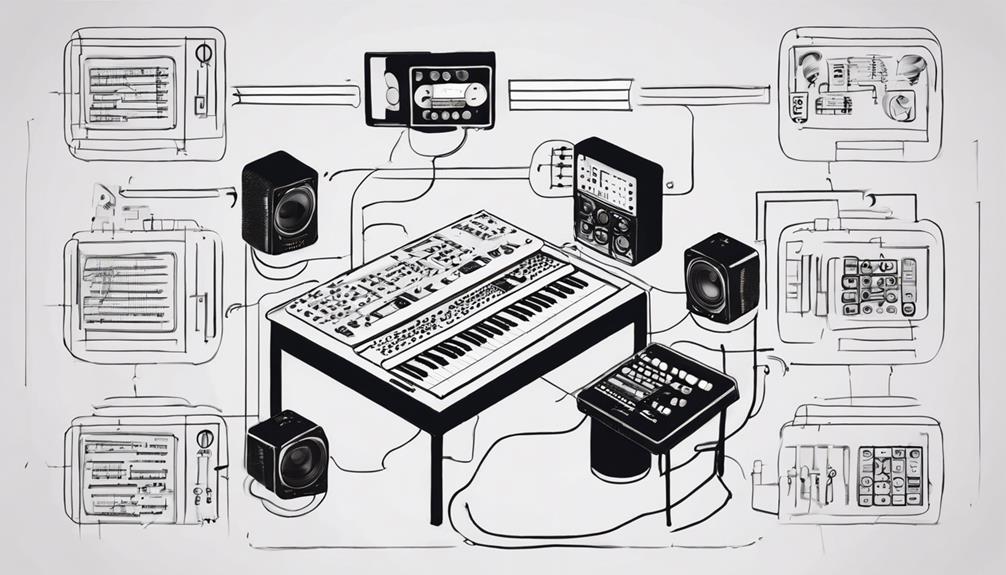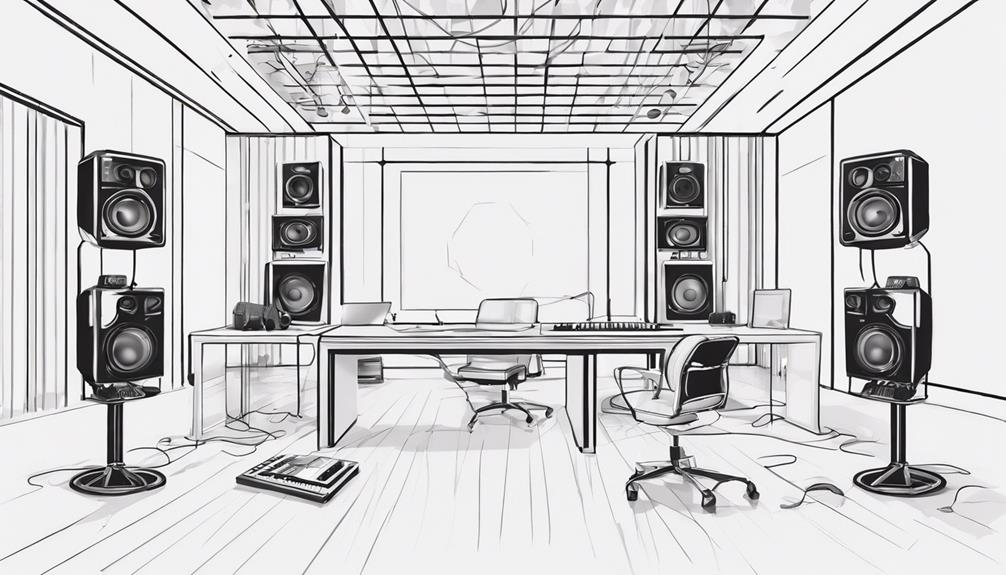To make a business plan for music production, start with an executive summary to hook investors. Conduct market research to know your audience and industry trends. Develop a marketing strategy focusing on CD sales and networking. Plan the production process meticulously, considering costs and timelines. Explore multiple revenue streams like beat sales and music licensing. Each step sets the stage for success in the music industry.
Key Takeaways
- Define business goals and target market.
- Conduct thorough market research for industry insights.
- Develop a detailed marketing strategy for revenue generation.
- Plan production process and budget efficiently.
- Diversify revenue streams for income growth.
Executive Summary
Crafted as a concise overview, the Executive Summary of your music production business plan effectively showcases key aspects for potential investors. This section encapsulates your business goals, target market, and financial projections, providing a snapshot of the main components of your plan.
Investors often turn to the executive summary to assess the viability of the business quickly. By presenting a well-structured summary, you can pique interest and prompt investors to explore deeper into the details of your plan. Make sure that your executive summary highlights the unique selling points of your music production business, emphasizing what sets you apart in the industry.
Clearly outlining the potential for profitability and growth within the summary will attract investors seeking promising opportunities. Remember, the executive summary serves as a gateway to the rest of your business plan, so make sure it's compelling and informative enough to captivate potential stakeholders.
Market Research

Understanding the music production industry through comprehensive market research is essential for identifying opportunities and challenges that impact your business strategy. Market research allows you to explore trends, target audience preferences, and consumer behavior within the music production industry.
Here are some key aspects to take into account:
- Discovering the market size and growth potential provides insights into the industry's opportunities and competition.
- Understanding music consumption habits and popular genres can help tailor your services to meet the demands of your target audience effectively.
- Engaging with industry professionals through surveys, focus groups, and interviews can offer valuable perspectives for shaping your business strategy.
Marketing Strategy

Developing a targeted marketing strategy is essential for establishing a strong presence and driving sales within the music production industry. To prioritize revenue generation, focus on CD sales at live gigs and through record retailers. Offer unique return-for-credit arrangements to retailers and capitalize on impulse purchases at live shows to boost sales.
Create a sales forecast that considers initial slow sales, revenue potential from signed bands, and online CD sales. Implement aggressive sales strategies to increase CD sales, with live gigs serving as a primary avenue for selling your music.
To enhance visibility and reputation, tailor your marketing plan to build networks within the music community. Emphasize the importance of establishing a strong presence in record stores and at live events to attract customers and drive revenue. Leveraging impulse purchases can lead to increased sales and foster a loyal customer base.
Production Process and Budget

To successfully execute your music production business plan, it's essential to efficiently manage the production process and budget for creating high-quality music tracks.
The production process for music involves recording, mixing, and mastering tracks to create a polished final product. When budgeting, consider costs for studio time, session musicians, mixing and mastering services, and artwork design.
Planning for contingencies is vital to allow flexibility for unexpected changes or additional expenses. Aligning your production timeline with the release strategy ensures that your music is ready for distribution and promotion at the right time.
Setting realistic dates for recording, mixing, mastering, and other production tasks will help you manage deadlines and stay on track with the project. Remember, the quality of your music production and the efficiency of your budgeting will play a significant role in the success of your music business.
Revenue Streams

To begin with, diversifying your revenue streams in music production can greatly enhance your income potential and business sustainability. There are various ways to generate income in this industry.
To start, you can sell beats, offer mixing/mastering services, and provide music production courses to aspiring musicians. Licensing your music for TV, films, commercials, and video games is another lucrative avenue to explore. Live performances and DJ gigs can also bring in revenue through ticket sales, merchandise, and sponsorships.
Additionally, selling sample packs, sound kits, and royalty-free music can serve as a passive income source. Collaborating with other artists, producers, and brands can open up revenue-sharing opportunities in music production. By tapping into these different revenue streams, you can create a more stable and profitable music production business.
Milestones and Review

Consider setting specific milestones in your music production business plan to track progress and achievements effectively. These milestones serve as checkpoints to evaluate your performance, helping you make necessary adjustments to stay on course towards your goals.
Regularly reviewing your milestones guarantees that you're focused and motivated in your music production business.
- Achieve Revenue Target: Meeting your set revenue target signifies growth and success in your music production endeavors.
- Expand Client Base: Increasing your client base not only boosts your business but also broadens your reach and impact in the industry.
- Complete Music Projects: Successfully finishing a certain number of music projects showcases your productivity and creativity, pushing you closer to your overall objectives.
Frequently Asked Questions
How to Make a Business Plan for Music Production?
To make a business plan for music production, identify your audience, unique selling proposition, and conduct market research. Develop a financial plan, outline marketing strategies, and create an operations plan for smooth operations.
How Do I Start My Own Music Production Business?
To start your own music production business, immerse yourself in industry trends, craft a solid business plan, acquire essential tools and space, network with music professionals, and market your services. Your passion will drive your success.
What Are 7 Steps to a Perfectly Written Business Plan?
Start by defining your target market and competition. Craft a compelling mission statement. Create a solid financial plan. Develop a detailed marketing strategy. Guarantee your executive summary is clear. Tailor your plan to stand out.
How to Structure a Music Business?
To structure a music business, focus on key sections like executive summary, market analysis, marketing strategy, operations plan, and financial projections. Tailor each part to suit your specific needs and goals. Clear writing is crucial for investor communication.
Conclusion
To wrap up, developing a business plan for music production is essential for success in the industry. Did you know that the global music production market is expected to reach $10.47 billion by 2026?
By following the step-by-step guide outlined in this article, you can effectively plan and launch your music production business with confidence. Don't forget to stay informed about industry trends and continuously adapt your plan to stay competitive in the market. Additionally, dedicating time to mastering bass music production techniques can set you apart as an expert in a highly sought-after niche. Building a strong portfolio that highlights your unique sound and technical skills will help attract clients and collaborators. Remember, persistence and creativity are key to growing your brand and achieving success in the music production industry.
Good luck on your music production journey!










